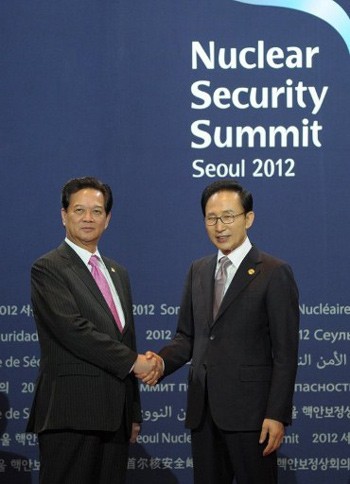(
VOVworld)- The second nuclear security summit in the Republic of Korea wrapped up on Tuesday with a plenary session, where world leaders discussed ways to protect nuclear materials and thwart nuclear terrorism. Though the objectives of the summit are clear, achieving those objectives is far from certain.
 |
| Prime Minister Nguyen Tan Dung and Republic of Korean President Lee Myung-bak at the welcoming ceremony in Coex Center, Seoul |
The Seoul nuclear security summit was the largest of its kind ever drawing the leaders of 53 nations and representatives of four international organizations. The international community is determined to stop nuclear terrorism and support the efforts of the United Nations and the International Atomic Energy Agency to prevent the production of materials for nuclear weapons. The summit discussed lessons learned from the crisis at Japan’s Fukushima nuclear power plant and implications for protecting other nuclear facilities and preventing radiation terrorism. Participants signed the Seoul Declaration reaffirming commitments to minimize the use of highly enriched uranium and expanding discussions on nuclear safety. At the last nuclear security summit in the US in 2010, US President Barak Obama set a target of controlling nuclear materials by 2014. Two years later, the world is still seeking ways to ensure nuclear security. The number of countries possessing nuclear materials is increasing and so is the capacity of terrorist organizations trying to obtain these materials. A recent report of the International Atomic Energy Agency says that in 2011, there were a total of 1,600 tons of enriched uranium and 500 tons of plutonium all over the world, enough to produce approximately 127,000 nuclear warheads. At the same time, between 1993 and 2011, there were more than 2,000 reports of leaks, thefts and illegal trafficking of radioactive materials. 60% of the stolen volume can’t be found.
Hong Van